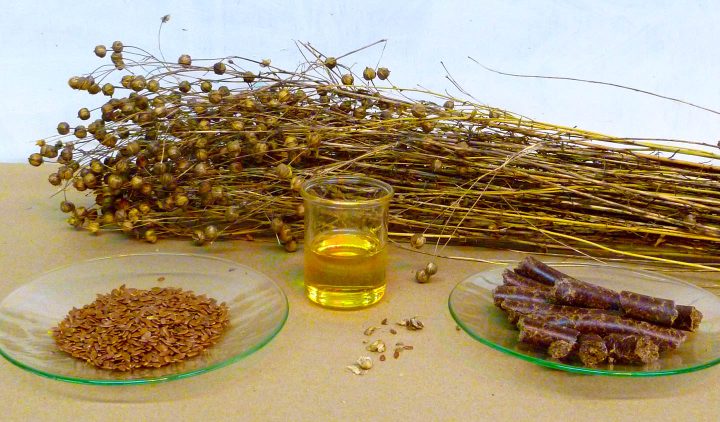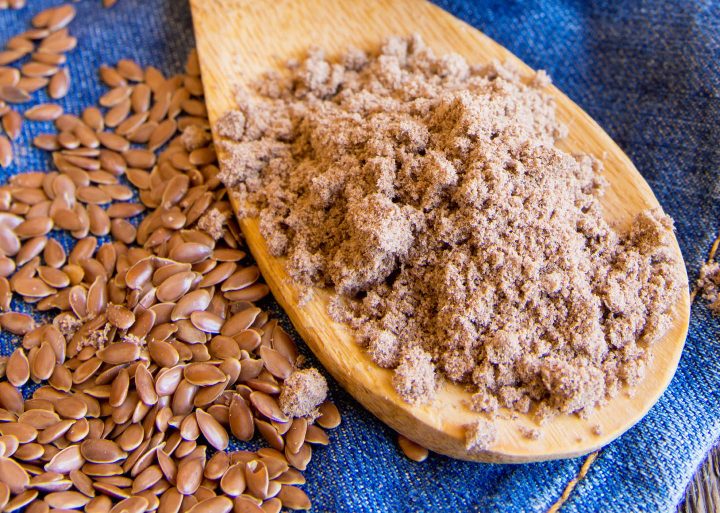Flax (Unum uisita-tissimum) may be one of the world’s oldest cultivated plants. In ancient times, flax was grown for its oil-bearing seed and its fiber. The ancient Egyptians used cloth woven from flax, and Hebrew high priests, as recorded in the Judeo-Christian Scriptures, wore garments made exclusively of flax.

Records from early civilizations reveal that flax was also used internally as a mild laxative and for its soothing action on irritated mucous membranes. Flax was also applied to the skin as a poultice for the treatment of local inflammations and the relief of pain.
Flax is an annual plant that grows up to five feet (1.5 meter) in height. Its sky-blue flowers are known to bloom only during the morning hours. It can be grown in both temperate and tropical regions of the world, but major commercial supplies of flax come from Argentina, Canada, North Africa and Turkey.
Flaxseed, or linseed as it is called in some parts of the world, consists of the dried, ripe seeds of the fruit, a globular capsule about one-quarter of an inch long. The flat, brown and glossy seeds are rich in both insoluble and soluble fiber. They also contain very high levels of lignans, linolenic acid (an omega-3 fat), and phenolic acids such as ferulic and sinapic acids, in addition to some useful protein. Flax also contains useful levels of potassium, magnesium, folic acid, iron and zinc.

Health Promoting Properties
In the last decades, American consumers have developed a fresh interest in the health-promoting properties of flaxseed and its oil. The seed and the flour derived from flaxseed are increasingly being used in breads, cereals, bagels, and other bakery products to provide not only a pleasant nutty flavor but also to increase the nutritional and health benefits of the final product.
Flaxseed flour can be successfully used in homemade baked goods. It can be added to cooked cereal, yeast breads, and muffins. About 10 to 20 percent of the wheat flour in a recipe can be replaced with flaxseed flour without any significant changes in baking.
The present popularity of flax was spurred by the research findings that it contains a high level of lignans as well as being a rich source of omega-3 fat. These hea1th-promoting substances make flaxseed a valuable addition to the diet. Clinical studies have shown that ground flaxseed is useful for protection against cancer and for lowering the risk of heart disease in patients with elevated blood cholesterol levels. Flaxseed also has been reported to have glucose-reducing effects.
Blood Lipid Changes
Flaxseed has been shown to lower serum cholesterol levels both in subjects with normal blood lipid levels and in those with elevated lipid levels. Flaxseed lowers blood lipid levels due to its soluble fiber content and its very low saturated fat content. When fifteen patients with elevated blood cholesterol levels were fed 15 grams of ground flaxseed and 3 slices of flaxseed-containing bread daily for three months, the patients experienced about a 10% decrease in total cholesterol and LDL cholesterol levels as well as a substantial decrease in platelet clumping, while their HDL cholesterol and triglyceride levels did not significantly change. Since defatted flaxseed can also produce a major drop in LDL cholesterol with a significant reduction in atherosclerosis in rabbits after only eight weeks, the cholesterol-lowering substance in flax is probably not the unsaturated fat. Ln another study, subjects with elevated blood cholesterol levels who consumed muffins made from partially defatted flaxseed experienced, on average, an eight percent drop in their LDL cholesterol levels over three weeks while their HDL cholesterol levels were unchanged.
Valuable Oil
Most flaxseed oil, for edible use, is cold-pressed to minimize oxidation during its production. Flaxseed oil is generally available from health food stores either in light-proof bottled containers for food use, or in capsule form to be taken as a supplement. Such oil should be refrigerated to limit oxidation and hence rancidity of the oil. The oil in the intact seed or ground seed appears to be quite resistant to oxidation during storage.

Unless fish is consumed, many Americans consume little omega-3 fat. The use of flaxseed or flaxseed oil is an easy and successful way for a vegetarian to increase the omega-3 content of their diet. Many vegetarians have a high intake of omega-6 fat from using the typical vegetable oils, such as soy and sunflower oils. Using flax will ensure an adequate intake of omega-3 and produce a more favorable ratio of omega-6 to omega-3 fat.
Omega-3 fat does not promote cancer and is known to lower triglycerides and decrease the risk of blood clots. Because of its rich omega-3 fat content flaxseed may also prove to be useful in the management of patients with autoimmune diseases such as rheumatoid arthritis and psoriasis.
Protection Against Breast Cancer
Animal studies have shown that flax added to the diet can significantly reduce the incidence of breast tumors and produce at least a 50 percent reduction in tumor size of chemically-induced cancers. The number of tumors may be reduced by almost 40 percent in carcinogen-treated rats. The cancer-protective properties of flax are believed to result from their very high level of lignans.
Flaxseed is the richest known source of lignans, with 100 to 800 times the level of lignans found in other oil seeds, cereals, and legumes. Plant lignans are metabolized in the colon by bacterial action. The breakdown products of lignan, which have a strong antioxidant activity, appear to be anti-carcinogenic. They bear a structure similar to estrogen and can bind to estrogen receptors and thereby inhibit the growth of breast cancer. Lignans may also produce positive effects in women with ovarian dysfunction.
Help for the Bowel
Today flaxseed is used as a mild laxative for chronic constipation and to relieve irritable bowel syndrome, diverticulitis, gastritis, and enteritis. Flaxseed is also used to correct bowel problems caused by the misuse and overuse of stimulant laxatives such as senna. The mucilaginous fiber in the seeds can absorb water in the colon, producing soft stools, Flaxseed fiber may also protect against colon cancer.
The use of flaxseed is considered safe. However, the use of large quantities of flax as a laxative with insufficient fluid intake can produce obstruction of the bowel. For gastritis and enteritis, the dose of coarsely ground meal is 1 tablespoon of whole seed with 150 ml of liquid, taken 2 to 3 times a day. A compress can be made from 30-50 grams (1 to 2 oz.) of flax flour, German Commission E suggests taking 1-3 tablespoons of whole or crushed flaxseed 2-3 times a day for chronic constipation. However, it is important that plenty of water be consumed with this remedy to avoid bowel obstruction.

Safety Issues
Flaxseed is known to contain some compounds, such as phytates and linatine, that may decrease the absorption of certain nutrients. While the di-peptide linatine can inhibit the utilization of vitamin B6, long-term use of flax does not seem to impair the B6 status of an individual.
Flaxseed contains small amounts of linamarin and other cyanogenic glycosides. These compounds are readily destroyed by the high temperatures normally experienced in cooking various bakery products. Any cyanogenic glycosides remaining in food will be rapidly converted in the body into thiocyanate, which may somewhat inhibit iodide uptake by the thyroid gland. Over a long period of time, goiter may develop in persons with a very low dietary iodine intake.
Conclusion
Flaxseed consumption at levels of fifty grams a day for several weeks has beneficial effects on the cardiovascular and immune systems without any harmful effects. A regular use of flaxseed flour appears to be a useful adjunct in the control of high blood cholesterol levels and provides useful protection against breast cancer.
This article was published originally in the Journal of Health and Healing, a publication of Wildwood Institute.

Stay Always Up to Date
Sign up to our newsletter and stay always informed with news and tips around your health.

Winston is Professor of Nutrition and Director of the dietetics internship program at Andrews University in Berrien Springs, Michigan, where he has taught health and nutrition classes since 1987.
Leave a Reply